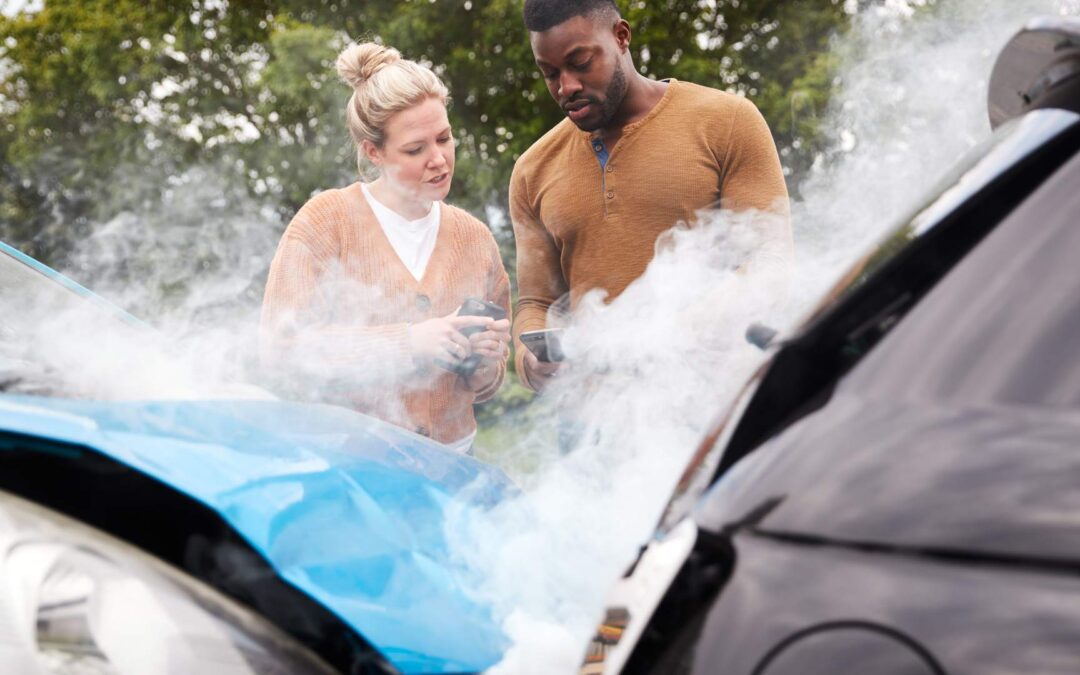Being involved in a car accident can be a terrifying and overwhelming experience, especially when you’re not at fault. In Georgia, the at-fault party is responsible for covering the damages and injuries caused by the accident. However, even when you’re clearly not at fault, the process of handling a car accident can be complex, requiring careful attention to detail and a clear understanding of Georgia’s legal and insurance systems. In this guide, we’ll walk you through the steps you should take to protect yourself legally and financially after a car accident in Georgia, where you’re not at fault.
Step 1: Ensure Safety and Call Emergency Services
The very first thing you should do after a car accident is ensure that everyone is safe. Check yourself and others for injuries, and if anyone is hurt, immediately call 911 for medical assistance. Even if the injuries seem minor, it’s always best to err on the side of caution and get medical help. Georgia law requires that accidents involving injury or death be reported to the police, so this step is not just for your safety—it’s also legally necessary.
In Georgia, it is also important to report accidents involving more than $500 in property damage. Once you have ensured safety, call the police to the scene. Having an official police report will be critical later when establishing fault and dealing with insurance claims.
Why the Police Report Is Crucial
A police report provides an unbiased third-party account of the accident, including details about the scene, the parties involved, and any traffic violations that occurred. The responding officer will assess the situation, interview witnesses, and make a preliminary determination about who was at fault. Having this report will be vital when dealing with insurance companies, as they will rely on it to establish fault and process your claim.
Step 2: Gather Evidence at the Scene
While waiting for the police to arrive, take the opportunity to gather as much evidence as you can from the accident scene. Georgia follows a traditional at-fault insurance system, which means the driver who is responsible for causing the accident is liable for the damages. Therefore, documenting the scene thoroughly is essential to proving you were not at fault.
Key Evidence to Collect:
- Photographs: Take photos of the accident scene from multiple angles, including damage to all vehicles, the surrounding environment (such as road signs, signals, and conditions), and any visible injuries. Make sure to take wide shots of the scene as well as close-ups of the damage.
- License Plate Numbers: Record the license plate numbers of all involved vehicles.
- Contact Information: Get the names, addresses, phone numbers, and insurance information from the other driver(s) involved. It’s also a good idea to collect contact information from any witnesses.
- Witness Statements: If there are any witnesses, ask if they are willing to give a statement to the police, and make a note of their contact information.
- Road Conditions: Make note of road conditions, weather, and any other external factors that could have contributed to the accident, such as poor signage, malfunctioning traffic lights, or debris in the road.
The more evidence you can gather, the stronger your case will be when it comes time to deal with insurance companies and, if necessary, a lawsuit.
Step 3: Seek Medical Attention
Even if you don’t feel seriously injured, it is essential to seek medical attention as soon as possible after the accident. Some injuries, like whiplash or internal bleeding, may not show immediate symptoms but can worsen over time. In Georgia, your medical records will play a key role in your car accident claim, particularly if you plan to seek compensation for medical bills, lost wages, or pain and suffering.
Why Prompt Medical Attention Is Critical
Failing to seek medical attention immediately after an accident can hurt your case when it comes to proving your injuries were caused by the accident. Insurance companies may argue that delays in treatment indicate your injuries weren’t serious or were not caused by the accident. Getting checked out by a doctor right away helps to establish a clear link between the accident and any injuries you’ve sustained, which will be critical when filing a claim.
In Georgia, personal injury claims must prove that the injuries were a direct result of the accident, so having a paper trail of medical treatment is invaluable. Keep detailed records of all medical visits, treatments, medications, and therapies related to the accident.

Step 4: Notify Your Insurance Company
After the accident, you should notify your insurance company as soon as possible, even if you were not at fault. Most insurance policies in Georgia require prompt notification of any accidents, and failure to do so can sometimes result in the denial of coverage. When speaking with your insurance company, stick to the facts and avoid speculating about who was at fault. Let them know you’ve filed a police report and that the investigation is ongoing.
Dealing with the Other Party’s Insurance
In Georgia, the at-fault driver’s insurance company is responsible for compensating you for your damages. However, the process can sometimes be slow or difficult, as the other insurance company may try to dispute the extent of your damages or injuries. In some cases, they may even try to shift some of the blame onto you. This is why having strong evidence from the scene, medical records, and a police report is so important.
Georgia is an “at-fault” state, which means that you can file a claim with your own insurance company or directly with the at-fault driver’s insurance company. If you choose to file with your own insurer, they will handle the negotiations with the other driver’s insurer, but keep in mind that this may affect your premiums.
Step 5: Determining Fault Under Georgia Law
In Georgia, determining fault in a car accident is based on the principle of negligence. This means that the party who is deemed to have acted negligently or violated traffic laws will be held liable for the accident. Georgia law follows a modified comparative fault rule, which means that you can still recover damages even if you are found to be partially at fault for the accident, as long as you are less than 50% responsible.
Modified Comparative Negligence in Georgia
Under Georgia’s modified comparative negligence rule, your compensation may be reduced by your percentage of fault. For example, if you are found to be 20% at fault for an accident, your total compensation would be reduced by 20%. However, if you are found to be 50% or more at fault, you will not be entitled to recover any damages.
This rule makes it particularly important to have solid evidence showing that you were not at fault. If the other driver’s insurance company tries to argue that you were partially responsible for the accident, you’ll need to present a strong case to avoid having your compensation reduced.
Step 6: Filing a Claim for Damages
Once fault has been determined, you can begin the process of filing a claim for damages. In Georgia, you are entitled to seek compensation for a wide range of damages after a car accident, including:
- Medical Bills: This includes both past and future medical expenses related to the accident, such as hospital stays, surgeries, medications, physical therapy, and rehabilitation.
- Lost Wages: If you missed work due to your injuries, you can seek compensation for your lost income. This can also include future lost earning capacity if your injuries prevent you from returning to work in the same capacity.
- Property Damage: You are entitled to compensation for repairs to your vehicle or the fair market value if your car is totaled.
- Pain and Suffering: Georgia allows victims of car accidents to seek compensation for non-economic damages like pain and suffering, emotional distress, and loss of enjoyment of life.
Georgia’s Statute of Limitations for Car Accident Claims
It’s important to be aware that Georgia has a statute of limitations for car accident claims. You have two years from the date of the accident to file a personal injury claim, and four years to file a claim for property damage. If you miss these deadlines, you may lose your right to seek compensation.
Step 7: Dealing with Insurance Companies
One of the most challenging aspects of handling a car accident, even when you’re not at fault, is dealing with the insurance companies. In Georgia, the at-fault driver’s insurance company is responsible for compensating you for your damages, but that doesn’t mean they’ll make it easy. Insurance companies often try to minimize payouts or deny claims altogether, which is why it’s critical to be prepared.
Tips for Dealing with Insurance Adjusters:
- Don’t admit fault: Even if you believe you may have been partially responsible for the accident, do not admit fault when speaking to an insurance adjuster. Leave fault determination to the police and your attorney.
- Stick to the facts: Provide clear, factual information about the accident, but avoid speculating or offering opinions about the cause of the accident or your injuries.
- Don’t accept a lowball offer: Insurance companies often make low initial settlement offers in the hopes that you’ll accept a quick payout. Before accepting any offer, consult with an attorney to ensure it covers all of your damages.
- Get everything in writing: Always request written confirmation of any settlement offers, communications, or agreements you make with the insurance company.
Step 8: Consider Hiring an Attorney
While not every car accident requires legal representation, hiring an attorney can be extremely beneficial if you were not at fault and the other driver’s insurance company is disputing your claim or offering a low settlement. An experienced personal injury attorney in Georgia will understand the intricacies of state law, including modified comparative negligence, and can help you build a strong case for compensation.
Why Hire an Attorney?
- Navigating the Legal Process: Car accident claims can be complicated, especially when dealing with insurance companies and proving fault. A personal injury attorney can help guide you through the legal process, ensuring that you don’t miss any important deadlines or make costly mistakes.
- Maximizing Compensation: Insurance companies often try to minimize payouts, but an attorney will fight to ensure that you receive fair compensation for your injuries, property damage, and other losses.
- Negotiating with Insurance Companies: Experienced attorneys know how to negotiate with insurance companies and can push back against lowball settlement offers. They can also help you gather the necessary evidence to strengthen your case.
- Representing You in Court: If your case goes to trial, having a skilled attorney on your side is critical. They will be able to present your case in the best possible light and argue for the maximum compensation available.
Conclusion: Protecting Your Rights in Georgia
Handling a car accident when you’re not at fault can be overwhelming, but by following the steps outlined in this guide, you can protect your rights and ensure that you receive fair compensation for your damages. Georgia’s at-fault insurance system can be complex, but with the right evidence, a strong understanding of the law, and, if necessary, the help of an attorney, you can navigate the process successfully.
If you’ve been involved in a car accident in Georgia and need assistance, don’t hesitate to reach out to a qualified attorney who can help you understand your options and fight for the compensation you deserve.

